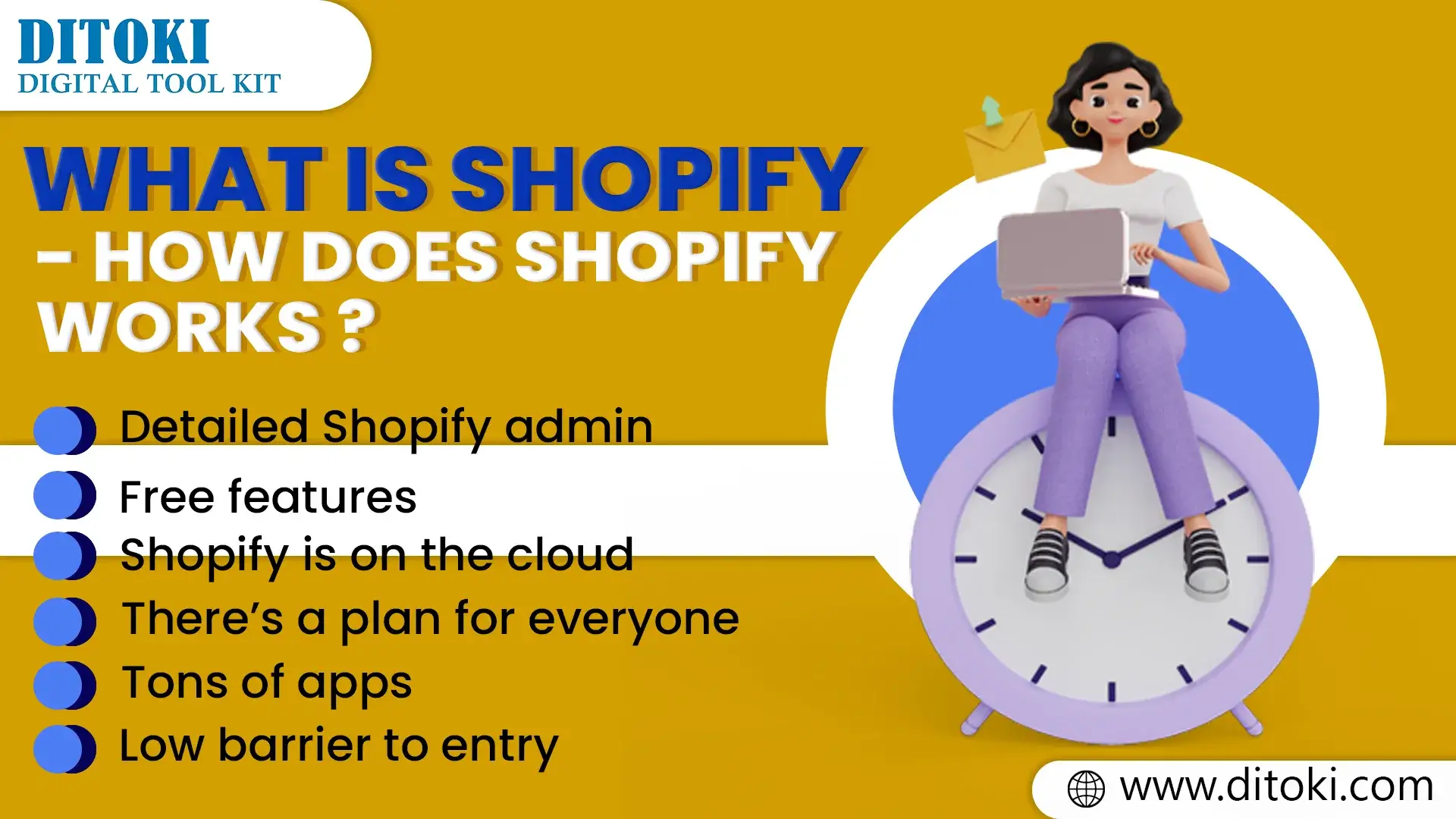You may have read about Shopify while perusing the web, but you may not be confident about how it functions or why it is important. We’re here to provide some insight, though.
We’ll explain what Shopify is, how to use it, what it provides, and a lot more in the sections below.
Let’s start now.

Selling online right away using it.
What is Shopify?
To create a store on the internet, you may utilize the Shopify e-commerce software. You can use a point-of-sale application to sell in person or via the Internet, utilizing your own website. Every person can utilize Shopify with ease, from novice wholesalers to high-growth D2C brands.
To try it for yourself, you may sign up for a free trial. You may create your own store, try out free Shopify apps, and, with enough marketing effort, generate revenue throughout your trial.

Using Shopify’s Basic plan will cost you $5 per month. Yet, the majority of new store owners begin with the $39/monthly basic plan. If you’ve had experience operating an online store, you might prefer the advanced plan. There is additional information on the various plans and features available in our article on Shopify pricing.
What is the Shopify starter plan?
They offer an e-commerce membership option called the Starter option. It is intended for newcomers who want to build small companies or individuals with an internet store.
The package comes with all the necessary components for setting up an online store, including tools for building websites, payment processing, inventory management, and shipping choices.
The Starting Plan is a fantastic choice for anyone who would like to begin selling online without having to spend a lot of time or cash upfront because it is inexpensive and simple to use. You are able to quickly establish your own online store with the Starter Plan and begin marketing your goods or services to people across the world.
What is Shopify Plus?
Shopify Plus is the enterprise marketplace designed by Shopify for bigger companies or companies aiming to grow. It has the ability to manage bigger transaction volumes, better reporting features, and assistance for customers with higher priorities, among other things.
How does Shopify work?
Both online and offline sales are combined on a single platform via Shopify. You may connect operations like inventory, marketing, payments, and shipping with Shopify. This makes it possible for you to incorporate whatever tools you require and streamline your operation.
Since it is a cloud-based application, you may use it on any internet-connected device. Additionally, since it is a completely managed e-commerce solution, Shopify merchants can forget about hosting their own websites.
Pros and cons of Shopify
Why should your e-commerce company utilize Shopify? However, Shopify has a few benefits over competing e-commerce platforms. To name a few:
Shopify pros
1. Detailed Shopify admin
You may find a wide variety of data and tools that will help you learn more about how your online business is doing in the back end of your Shopify store.
Your top-performing product pages can be located here. You can quickly see how many orders there are. Additionally, you can check the live feed of the users on your website to determine where they are in the sales funnel.
It is a thorough tool for an online merchant that enables you to fully comprehend the setting of your site.
2. Free features
You’ll definitely have to pay for a theme (the layout and appearance of your website) if you’re creating a new one. On the other hand, a freely editable theme is included by default on Shopify web stores.
Your free Shopify theme can be customized to match your company’s visual aesthetic. You can add pictures in addition to changing the text and color scheme. Because of this, it is perfect for new users who want to jump in or experiment to see what’s possible. (Of course, Shopify also has premium themes for those looking to add more substance to their design.)
3. Shopify is on the cloud
The fact that your website is hosted on a cloud network rather than on a server is an additional advantage of Shopify. Everyone who has ever paid for a server knows that sometimes they crash when you least expect them, costing you a lot of cash in downtime.
For instance, during major events like Black Friday, systems frequently fail. You just had to hope that the other websites are not quite as famous if you use a server, which is what the majority of new business owners can afford.
Yet, cloud hosting lessens the likelihood that your website will go down, letting you manage your business with ease. Also, the hosting fee is included in your membership, so that’s one less thing for you to think about.
4. There’s a plan for everyone
Let’s face it: starting an online store takes money. Products, advertising, a new domain, and e-commerce software will all cost money.
Yet there is a pricing option available to everyone on Shopify. If money is very limited for you, Shopify Beginning is only $5 per month. Choose Shopify Plus if you’re seeking a white-glove service. You can progress through the plans as your company expands as well.
5. Tons of apps
For practically anything, there is an app available in the Shopify App Store. There are apps for product sourcing, image background removal, countdown clocks, and more. Although some Shopify applications require a fee, many of them are available for free.
You don’t need to incorporate an app into your website. So if you want to add items to your store, think about using the DSers app (the Basic Shoplan is free and includes up to 3,000 products in your store).
6. Low barrier to entry
It’s difficult to launch an online business. Yet compared to 20 years ago, it’s much simpler.
Did you know that when Amazon originally started, customers had to submit checks to the company? Yes, those times are behind us. The truth is that as time goes on, creating an online business will get simpler.
Shopify is driving the effort to make it easier for business owners to launch online storefronts. You can see why thousands of people sign up for the platform each year by comparing Shopify to alternative options.
Shopify cons
1. It takes time to see the results
Establishing a Shopify store is more like starting a business than creating a passive revenue source.
However, starting a business isn’t always simple. It takes months of trial and error to figure out how to utilize it and create a successful store. Knowing where each part of your store is in the Shopify dashboard can take some time.
Yet it is generally easy to use. Just some practice is needed.
2. Shopify alone won’t guarantee your success
Operating an online bookstore is easier with Shopify’s amazing features and apps than it is with custom-built websites.
The catch is that you are responsible for the success of your store. The proper mindset is what will motivate you to learn. To market your company more effectively than the competition, you must possess marketing expertise.
Your achievement ultimately rests in your arms, not Shopify’s.

What can you sell on Shopify?
There are constantly fresh, in-demand items that you can offer on it. You can sell everything, including items for the home and garden, style, and cosmetics. Here are a few well-liked items you might think about selling:
- Clothing
- Jewelry
- Home Accessories
- Travel products
- Baby or maternity products
- Bags and luggage
- Fitness accessories
- Beauty products
- Kitchenware
- Pet products
- Automotive accessories
- And much more!
It does, however, have a stringent list of prohibited items. You run the risk of having your account banned on Shopify if you sell prohibited goods like those listed in the platform’s terms of service. This list consists of:
- Certain firearms and their parts
- Counterfeit or unauthorized goods
- Gambling products
- Regulated products or services
- Adult products
- Drug paraphernalia
- Event tickets
Essentially, if it’s prohibited or controlled, it probably can’t be sold. While acquiring products for your business, it helps to understand the methods for avoiding buying fake goods if you’re new to online selling.
What is the Shopify POS system?

- Shopify POS is a robust platform that enables retailers to oversee their company’s processes and sell goods in person or at events.
- The system is a comprehensive option for in-person selling because it has a number of functions like managing inventory, payment systems, customer management, and sales analytics.
- Due to its compatibility with iOS and Android devices, Shopify POS is available to retailers who use tablets or smartphones.
- Using Shopify POS, business owners can quickly add products, control inventory, and accept payments using a dependable and secure platform.
- Additionally, the system enables businesses to design customized orders for customers, simplifying the management of intricate transactions and enabling real-time item additions.
- Shopify POS can be utilized at pop-up stores, marketplaces, and festivals as well, giving business owners a convenient and dependable option for in-person sales.
- The technology is simple to use and gives retailers real-time information on their revenue and stock levels, enabling them to make wise business decisions.
Click here to learn about AWS.
What are the Shopify payment methods?

Shopify Payments is the company’s internal payment service. You are capable of accepting payments using all widely used payment methods, including debit cards, credit cards, cryptocurrencies, Apple Pay, Amazon Pay, and Apple Pay.
The key selling point of Shopify Payments is that there are no additional transaction costs. This implies that you get to keep more of your net income after taxes and other deductions. Additionally, the procedure is native to Shopify’s online stores, which improves the purchasing experience by removing the need to reroute customers to a third-party gateway.
